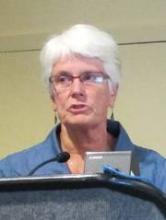BALTIMORE – Children with complex partial seizures more often had long-term social, psychiatric, and school challenges and worse seizure outcomes than did children with only secondarily generalized seizures in a subanalysis of patients in a population-based cohort study.
"At least 50% of those with complex partial seizures have difficult-to-control seizures without remission, and up to 70% have poor social and school success and significant psychiatric and social comorbidity," Dr. Carol Camfield said at the annual meeting of the American Epilepsy Society. "This [seizure type] should be a red flag to get these children intensive medical and social interventions."
The majority of otherwise normal children with epilepsy have complex partial seizures, or focal seizures with secondary generalization, said Dr. Camfield, professor of pediatrics at Dalhousie University Medical School in Halifax, N.S. "Typically they don’t have a specific epilepsy syndrome at the time of diagnosis, and the overall remission rates are high in those with normal intelligence." However, she said, only a few studies have examined the long-term social and psychological outcomes of these two specific seizure types.
Dr. Camfield attempted to do that by drawing on a subset of patients in the population-based Nova Scotia Childhood Epilepsy Study. The study includes 692 adults who were diagnosed with epilepsy during 1977-1985. Some of the patients now have more than 30 years of follow-up data.
Dr. Camfield’s subanalysis of the study included 57 patients with focal epilepsy who had secondary generalized seizures and 88 who had partial complex seizures with or without secondary generalization. The patients had onset of epilepsy at an average age of 7 years and were followed for an average of nearly 28 years. All had normal intelligence and normal neurologic exams at the last follow-up visit.
Overall, patients with only secondary generalization (SecGen) had significantly better long-term physical and psychosocial health than did those with partial complex seizures (PCS), Dr. Camfield said.
SecGen patients had significantly better seizure outcome than did PCS patients. Most of the SecGen patients (97%) had at least one 5-year seizure-free period, compared with 64% of the PCS patients. This was highly statistically significant, with a P value of .00005. "We have never seen P values like this in any of our studies [on this group]," she noted.
While most patients in both groups were seizure free at the last follow-up, the rate was significantly higher in the SecGen group than in the PCS group (98% vs. 68%). Likewise, terminal remission – defined as being seizure free and off all antiepileptic drugs – was significantly more common among the SecGen group (82% vs. 44%).
"This [seizure type] should be a red flag to get these children intensive medical and social interventions."
The SecGen group also was significantly less likely to have intractable epilepsy and to have undergone epilepsy surgery, or either alone (5% vs. 38%).
The group with PCS also had significantly worse psychosocial outcomes than did the SecGen group. Although all had normal intelligence, 44% of the PCS group had a diagnosed learning disorder, 55% had repeated a grade in school, and 90% had undergone neuropsychological testing, either at the medical center or in the school system.
Significantly more of the PCS patients had visited a psychiatrist or psychologist, and had a diagnosed psychiatric disorder (64% vs. 26%).
"Marriage is also considered a good outcome," Dr. Camfield said. "In the SecGen group, 44% were married by age 34, significantly more than 27% of the PCS group."
"If otherwise normal children with a focal epilepsy have complex partial seizures, their progress over the next 25 years is ominous, compared with the relatively carefree outlook for those with secondary generalized seizures only," she said.
Dr. Camfield had no financial disclosures.


